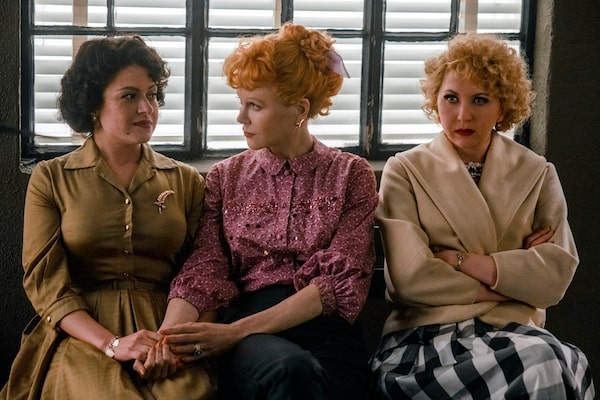
Nicole Kidman and Javier Bardem star in Being the Ricardos.Glen Wilson/ © 2021 Amazon Content Services LLC/Amazon Content Services LLC
Plan your screen time with the weekly What to Watch newsletter. Sign up today.
Being the Ricardos
Written and directed by Aaron Sorkin
Starring Nicole Kidman, Javier Bardem and J.K. Simmons
Classification R; 125 minutes
Streaming on Amazon Prime Video starting Dec. 21
In a recent interview, Nicole Kidman, star of the new I Love Lucy docudrama Being the Ricardos, admitted that she nearly backed away from the role after portions of the internet turned on her casting announcement. “I went, ‘Oh no, I’m not right. Everyone thinks I’m not right so I’m going to try to sidestep this,’” Kidman said, referencing a certain segment of social media’s desire for someone like, say, dead-ringer Debra Messing to step into Lucille Ball’s sitcom-ready shoes.
As ever, though, the internet was wrong and Nicole Kidman was right: The actress offers an impressively wry and layered take on an icon few of us actually know much about beyond time-capsuled catch-phrases and the whispers of prime-time legends. Kidman’s casting might not be the move that some anticipated, but it is the move that Ball’s legacy deserves. The trouble is that the film Kidman signed on for is not quite there.
Basically, whenever writer-director Aaron Sorkin steps away from his strengths – chronicling behind-the-scenes power plays with the wit of Wilde and the speed of Sonic the Hedgehog – and instead attempts to embrace the more personal and intimate touches that define real people’s actual lives, the film falls apart. The best Sorkin creations are swift-walking, fast-talking zinger machines, creations that energize the filmmaker’s big ol’ brain and result in such memorable, if sometimes jangly paced, productions as Molly’s Game and The Trial of the Chicago 7. If you need relatable characters with genuine emotional depth, though, then Sorkin just isn’t your guy – or at the very least, he’s your screenwriter and not your director.

Tony Hale in Being the Ricardos.Glen Wilson/ © 2021 Amazon Content Services LLC/Amazon Content Services LLC
Which is a big problem for Being the Ricardos, given that it’s half a heavily caffeinated look at how network television was made back in its infancy, and half a slower-burn melodrama following two diametrically opposed lovers trying to save themselves through a doomed marriage.
Following one hectic September, 1952, week on the production of CBS’s I Love Lucy, Sorkin’s film kicks off with a delightfully propulsive hum of smart people saying smart things to each other. Lucille and her husband/creative equal/sparring partner Desi Arnaz (an excellently, if not also uncontroversially, cast Javier Bardem) are working on the second season of their sitcom while facing three crises. First, Lucille is outed by radio-news titan Walter Winchell as a one-time member of the Communist Party. Second, Arnaz is accused of cheating on Lucy by the tabloids. And third, the couple are expecting a baby – and want the pregnancy to be worked into their series, which is a problem for a network that would prefer its viewers remain ignorant of how babies are made.
As Lucille and Desi navigate each dilemma – with snippy and snappy turns from supporting players like J.K. Simmons as I Love Lucy co-star/commie hater William Frawley, Alia Shawkat and Jake Lacy as I Love Lucy writers Madelyn Pugh and Bob Carroll, and Clark Gregg as a nervous CBS executive – Sorkin delights in blending and bending culture, history, politics and his signature tick-tick-boom dialogue into his own nervy, electrifying package. It is an added bonus that the film offers Sorkin the chance to not-lightly examine his own time spent in the network-TV trenches, and ponder what his legacy might look like more than half a century later.
Perhaps if Sorkin stuck to the one-week, behind-the-scenes narrative, Being the Ricardos would deserve the laughter of a live studio audience. But he makes a critical misstep in frequently dipping out of his timeline to chronicle the beginnings of Lucille’s career and her romance with Desi, jettisoning all the film’s wonderfully clever characters and their rat-a-tat-tat milieu for something more emotive and, well, real. Too real, it seems, for Sorkin’s keyboard to honestly dramatize.

Alia Shawkat, Nicole Kidman and Nina Arianda in Being the Ricardos.Glen Wilson/ © 2021 Amazon Content Services LLC/Amazon Content Services LLC
What’s worse: There is a bizarre faux-documentary conceit to the whole thing, in which Sorkin has actors Linda Lavin and Ronny Cox play older versions of Pugh and Carroll, giving audiences a weird ratio of two performers per real person. But this docudrama-wrapped-in-a-documentary-wrapped-in-a-mockumentary shtick is easier to wave away than when Sorkin tries to craft things like believable romance or emotional frailty. Ditto the moment when, in a supremely curious wink at Hollywood’s political climate circa 1952, Sorkin employs the words of J. Edgar Hoover for a stand-up-and-cheer moment.
With some deft trimming, Being the Ricardos could be a fine HBO Sunday night movie “event,” as they used to be (or still are?) called. But as it is, this is less a cinematic thing and more an elaborate joke without a kicker. As Lucille Ball might say: waaaaaaaah.
In the interest of consistency across all critics’ reviews, The Globe has eliminated its star-rating system in film and theatre to align with coverage of music, books, visual arts and dance. Instead, works of excellence will be noted with a Critic’s Pick designation across all coverage.
 Barry Hertz
Barry Hertz